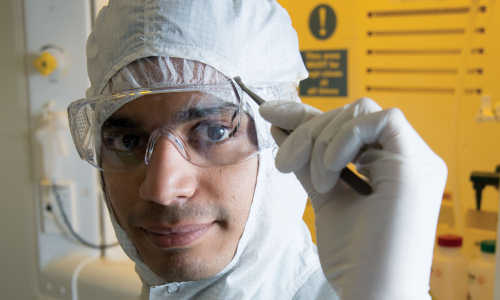Researchers have brought ultra-fast, nano-scale data storage within striking reach, using technology that mimics the human brain.
Dr Sharath Sriram, RMIT University. Photo Credit: RMIT University
The researchers have built a novel nano-structure that offers a new platform for the development of highly stable and reliable nanoscale memory devices.
The pioneering work will feature on a forthcoming cover of prestigious materials science journal Advanced Functional Materials (11 November).
Project leader Dr Sharath Sriram, co-leader of the RMIT Functional Materials and Microsystems Research Group, said the nanometer-thin stacked structure was created using thin film, a functional oxide material more than 10,000 times thinner than a human hair.
“The thin film is specifically designed to have defects in its chemistry to demonstrate a ‘memristive’ effect – where the memory element’s behaviour is dependent on its past experiences,” Dr Sriram said.
“With flash memory rapidly approaching fundamental scaling limits, we need novel materials and architectures for creating the next generation of non-volatile memory.
“The structure we developed could be used for a range of electronic applications – from ultrafast memory devices that can be shrunk down to a few nanometers, to computer logic architectures that replicate the versatility and response time of a biological neural network.
“While more investigation needs to be done, our work advances the search for next generation memory technology can replicate the complex functions of human neural system – bringing us one step closer to the bionic brain.”
The research relies on memristors, touted as a transformational replacement for current hard drive technologies such as Flash, SSD and DRAM. Memristors have potential to be fashioned into non-volatile solid-state memory and offer building blocks for computing that could be trained to mimic synaptic interfaces in the human brain.
The research, which was supported by an Australian Research Council Discovery grant, was a collaboration between members of the Functional Materials and Microsystems Research Group and Professor Dmitri Strukov from the University of California, Santa Barbara.
Story Source:
The above story is based on materials provided by RMIT University.





